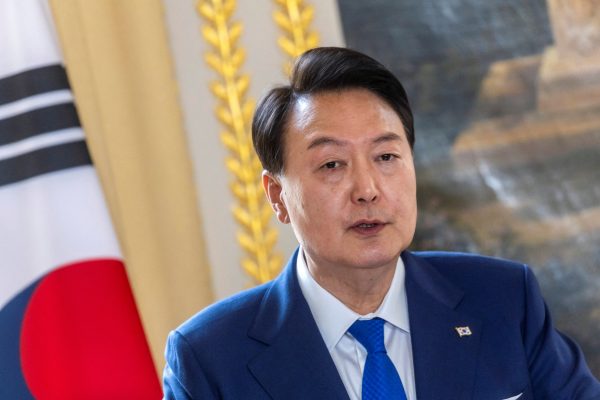Yoon’s approval rating has declined from the low 50s since his inauguration and has fluctuated between the high 20s and low 40s. While Yoon’s domestic approval improved after diplomatic visits to the United States and the G7 Summit in Japan, it has not returned to pre-inaugural levels.
Yoon has contentious relations with the opposition Democratic Party, which controls South Korea’s National Assembly. The partisan conflict has reached new heights under Yoon. For the past year, the government and the opposition party’s leadership have not held a formal meeting. The Democratic Party has condemned Yoon’s government for approving investigations into corruption allegations surrounding the Party’s leader Lee Jae-myung as politically motivated. In retaliation, the opposition party has advocated for investigations into First Lady Kim Keon-hee.
Yoon’s political agenda has stalled under the partisan gridlock. The proposed pension, labour and education reforms, such as greater transparency of labour unions’ auditing, flexibility in employees’ work hours, and the abolition of the direct election of the education superintendent, have stymied. Yoon has also vetoed the Grain Management Act and Nursing Act passed by the National Assembly. With few substantive legislative achievements, even citizens supportive of Yoon’s policies have become sceptical about their successful implementation.
Yoon has also struggled to expand domestic political support because of the fractures and controversies within the government. Traditional (often older) conservative voters and more ideologically heterogeneous (often younger male) voters make up Yoon’s support base. But support for Yoon’s government among younger voters has declined.
Young voters have criticised Yoon’s government for replicating what they perceive as the cliquish governance of former president Moon Jae-in’s government. The President’s Office has been criticised for marginalising prominent figures within the ruling People’s Power Party, including Yoo Seong-min, Lee Jun-seok and Ahn Cheol-soo, who formed a unity ticket with Yoon in the presidential election. Controversial remarks and conduct by government members have contributed to public perceptions that Yoon’s presidency has fallen short of upholding the promise of ‘fairness and common sense’.
Yoon’s government has struggled to communicate its policies effectively to the broader public on several contentious political issues. After the crowd crush incident at Itaewon, Yoon’s government rejected demands for the resignation of the Minister of Interior and Safety. But the public perceived the decision as an attempt to avoid political responsibility. The government’s proposal to implement flexible labour hours was also met with public backlash due to widespread concerns about the extension of weekly work hours for employees.
Yoon’s foreign policy has also heightened the domestic political divide. Yoon’s supporters have approved his deepening of South Korea’s strategic partnerships with the United States and Japan and more assertive stances against North Korea and China. Critics, though, say that Yoon is escalating geopolitical tensions and sacrificing South Korea’s interests to Japan and the United States. Despite their policy merits, Yoon’s government has been perceived as making contentious policy decisions without sufficiently consulting domestic critics.
South Korea’s next National Assembly election is in April 2024. If the government aspires to a legislative mandate to enact its agenda, Yoon’s second year in office must be more successful than his first in internal governance and public communication.
Yoon’s government must display discipline in managing a more cohesive and inclusive political coalition. Government figures and officials whose behaviour and rhetoric undercut Yoon’s promise to uphold ‘fairness and common sense’ should be censured. Yoon’s government should also incorporate policymakers with more diverse backgrounds, including those outside the president’s inner circle and even his critics, reaffirming Yoon’s own campaign promise of a ‘big tent’ government.
The government should honour its promise to prioritise ‘interaction’ with citizens. Yoon relocated the presidential office from the Blue House to the government complex in Yongsan, symbolising his commitment to political accessibility. But Yoon’s daily informal press interviews were soon suspended and the President’s office has received criticism for limiting press interviews. Yoon should resume outgoing interactions with the press and citizens.
There is some scepticism about whether open communication could persuade the public in today’s polarised political environment. But a proactive display of political dialogue and articulation of policies, even if such outreach does not always persuade critics, leaves a positive public impression on Yoon’s commitment to overcome the constraints of a divided government. Yoon has shown improvements in his communication overseas and he should also improve his communication with domestic constituents, starting with resuming the official press conference for the first time since August 2022.
Yoon’s government will likely face continued partisan gridlock in its second year. The government must respond to the challenge with a renewed commitment to improving internal governance and public communication to be successful. The government’s actions will determine whether constituents will endorse Yoon’s presidency with a stronger political mandate in the next National Assembly election.
If Yoon succeeds, his presidency might experience a political turnaround similar to former president Roo Moo-hyun’s government. In 2004, Roh’s government overcame low approval ratings and the South Korean legislature’s opposition to his leadership — even impeachment — in its first year to win the subsequent National Assembly election.
If Yoon fails, though, his presidency might become the first not to have a legislative majority throughout its 5-year term.
Jong Eun Lee is Adjunct Faculty at the School of International Service, American University.

